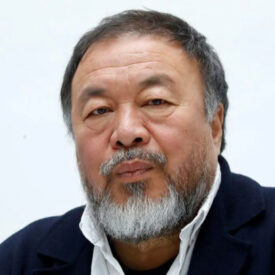
AI WEIWEI
Director, Turandot
Ai Weiwei is one of the world’s most famous contemporary artists. Born in Beijing on August 28, 1957, to Ai Quing, a well-known Chinese poet, he graduated from the Film Academy and founded the Stars Art Group in the 1970s, the first to exhibit contemporary art in China. In 1981, he moved to the United States where he made his living as an extra in Zeffirelli’s Turandot at the New York Metropolitan Opera House, through the introduction of choreographer Chiang Ching. He gradually became world-famous, exhibited his first solo show at the Ethan Cohen Gallery in New York, then in 1993, returned home to care for his ailing father. Eventually, he went on to combine his work as an artist with his work as an architect and designer. Among his most famous works is Map of China: a sculpture composed of a puzzle of the timbers that were part of the now-destroyed temples of the Quing dynasty (1644-1911). Always active in the field of human rights, he strongly opposed the Chinese regime, so much so that he was arrested in 2011, and transferred to a secret location for 81 days. Turandot is his first experience as an opera director.
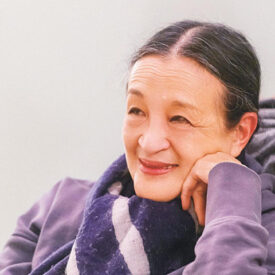
CHIANG CHING
Choreographer, Turandot
A choreographer of Chinese descent, she traveled the world for work from a young age. In 1978, she returned to China to teach at the dance academy where she herself trained. There she met Ai Quing, the famous poet whose poems she read when she was a student. The two were guests at the same hotel and a friendship was born. A few years later Chiang Ching was in New York and met Ai Weiwei and his brother, two young men who fled China and were living hand to mouth. She was surprised to discover that they were Ai Quing’s sons. When she started working on Zeffirelli’s Turandot, she pointed them out as possible extras, and Ai Weiwei was hired.

OKSANA LYNIV
Principal Conductor, Turandot
Born in Brody, Ukraine to two musicians, she studied piano, flute, violin, and singing from an early age. She studied conducting at the Lysenko Academy of Music in Lviv, then began working around the world (Odessa, Stockholm, Graz). In March 2021, she arrived in Italy making her debut at the Teatro Comunale in Bologna, in a concert streamed without an audience due to the Covid-19 pandemic. It is the first time a woman has been appointed music director in an Italian opera house. She became famous for her public stances against the Russian invasion of Ukraine. In 2022, she directed Ai Weiwei’s Turandot at the Rome Opera House.
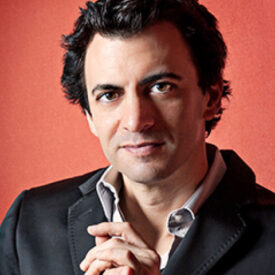
ALEJO PÉREZ
Conductor, Turandot
Born May 3, 1974, in Buenos Aires, he holds degrees in both composition and conducting. He has become famous for his intrinsic stylistic awareness and ability to bring to life every detail of the most complex score, and enjoys success not only in Argentina but also in all the major European opera houses (Paris, Vienna, Warsaw, Leipzig, Rome).

CARLO FUORTES
Rome Opera House, Superintendent
Born in Rome on September 5, 1959, he graduated in statistics and economics from La Sapienza University. A manager and cultural economist, he directed the Palazzo delle Esposizioni and Scuderie del Quirinale from 2002 to 2003, and administered the Auditorium Parco della Musica from 2003 to 2015. On December 23, 2013, he was appointed Superintendent of the Rome Opera House, a position he held until July 9, 2021, when he became CEO of RAI.
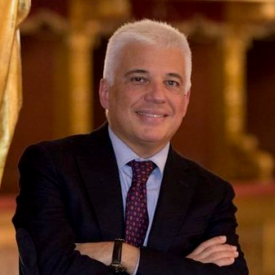
FRANCESCO GIAMBRONE
Rome Opera House, Superintendent
Born in Palermo in 1957, he has been a journalist since 1982, working with the newspapers Il Giornale di Sicilia, Il Mattino and La Repubblica, and a hospital doctor since 1988. Councilor for Culture of the City of Palermo from 1995 to 1999, and also from 2012 to 2015, he was Superintendent at the Fondazione Teatro Massimo in Palermo (1999-2002), the Fondazione Teatro del Maggio Musicale Fiorentino (2006-2010) and finally, in December 2021, of the Rome Opera House.
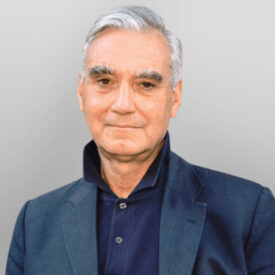
ALESSIO VLAD
Rome Opera House, Artistic Director
Artistic director of the Rome Opera House since 2010, he has written music for film and theater, working with directors such as Giorgio Ferrara, Cristina Comencini, Bernardo Bertolucci and Franco Zeffirelli.
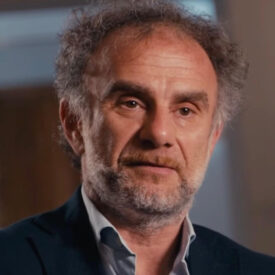
ANDREA MIGLIO
Rome Opera House, Set Designer
Graduated in set design with honors, he has been working with the Rome Opera House for nearly 25 years, taking care of the sets for opera productions. Throughout his career, he has worked on the sets of the most famous opera houses, including La Scala.

ANNA BIAGIOTTI
Rome Opera House, Costume Head
A Milanese costume designer, after an important collaboration with the Teatro alla Scala she has led the tailoring department of the Rome Opera House and its Historical Archives for the past two decades. Since 1942, the tailoring of the Rome Opera has been one of the most recognized and qualified at the theatrical level for the craftsmanship of stage costumes.

OKSANA DYKA
Soprano, Turandot
Born June 16, 1978, in Zhytomyr, she is a well-known Ukrainian soprano. She sings all over the world, enjoying success as much in Montpellier as in Tel Aviv or New York, but decided to settle in Tuscany. She has performed the role of Turandot several times, both in Ai Weiwei’s and Zeffirelli’s versions.

FRANCESCA DOTTO
Soprano, Turandot
Born in Treviso in 1987, she graduated in flute from the Martini Conservatory in Bologna in 2006, before embarking on and graduating with honors in voice studies at the Steffani Conservatory in Castelfranco Veneto. After many important performances, she became famous playing Violetta in La Traviata at the Teatro Verdi in Sassari. With Ai Weiwei, she tries her hand at the complex role of Liù.

MICHAEL FABIANO
Tenor, Turandot
Born in Montclair, New Jersey, on May 8, 1984, he is one of the best-known tenors in the United States. He has performed leading roles at the San Francisco Opera and the Metropolitan, Opéra National in Paris, Teatro La Scala in Milan, and Teatro Real in Madrid. With Ai Weiwei, he is performing the role of Calaf for the first time.